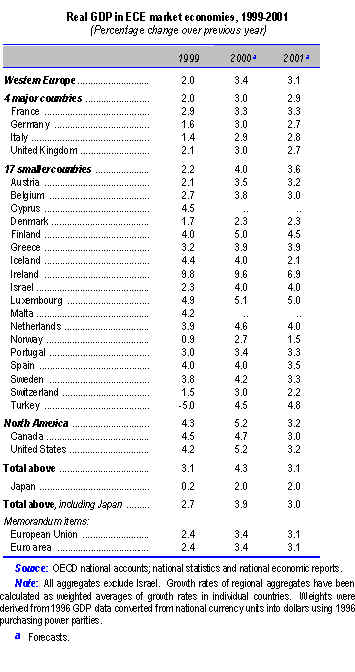[Français][Russian]
EMBARGO
Not to be released before
Wednesday, 6 December 2000
00:01 GMT
Press Release ECE/GEN/00/27
Geneva, 30 November 2000
Western Europe and North America: Economic Situation
Still Very Favourable
UN/ECE releases its second 2000 Economic Survey of Europe
"The current economic situation in Europe and North
America is better than at any time in the last decade." stresses Mrs. Danuta Hübner,
Executive Secretary of the United Nations Economic Commission for Europe (UN/ECE)
commenting the latest issue of the Economic Survey for Europe, just released by the
UN/ECE. "The dynamism of the world economy has stimulated growth in western Europe
via foreign trade and the close links between western and central Europe have similarly
boosted economic growth in the latter."
Current forecasts are for a continuation of the cyclical recovery in
western Europe, with real GDP expected to increase by about 3 per cent in 2001, down from
3.4 per cent this year (see table). The growth forecasts are the same for the euro area.
The relatively mild slowdown expected in 2001 reflects the lagged effects of the
progressive tightening of monetary policy and the less supportive global economic
environment, notably the weakening of economic growth in the United States, and the rise
in oil prices. Some offset to these factors will be provided by tax cuts, notably in
France, Germany and Italy. Both private consumption and fixed investment should remain
relatively strong, and exports are expected to continue to be an important source of
growth in 2001. Current forecasts assume that the gains in price competitiveness
associated with the weakness of the euro will be only partly reversed in 2001.

In the United States, the annual growth rate of GDP is expected to slow
down from somewhat more than 5 per cent in 2000 to some 3¼ per cent. This is in line with
the "soft landing scenario" in which growth of actual output in the United
States will fall below the growth of potential output in the continued presence of
moderate inflation. Such a development should allow for an orderly unwinding of the
existing domestic and external imbalances. The slowdown in economic growth also partly
reflects the impact of the progressive tightening of monetary policy. Also the wealth
effect, which has supported private consumption in recent years should weaken, given the
fall in asset prices. This should at the same time lead to some increase in the personal
savings rate.
The short-term economic outlook for the western market economies and
the global economy, however, remains subject to a number of important downside risks,
which have not diminished in recent months. These risks originate largely in the
considerable imbalances which have built up in the United States economy and which, in
turn, are reflected in the strong dollar. As a result, the possibility of a hard landing
– involving sharp falls in share prices and the dollar – cannot be discarded.
Such an outcome would, of course, lead to adverse spillovers in the rest of the world
economy. The unexpectedly large increase in international oil prices, moreover, has
further increased the uncertainty surrounding the international economic outlook. Current
forecasts assume that the high level of oil prices will not be sustained in 2001 and that
they will fall back to the OPEC target range of $22-$28 per barrel. Sustained high oil
prices, however, would lead to a stronger than expected dampening of economic growth and
increase the risk that wage earners will demand higher wages to offset the losses in their
real incomes. This could trigger a wage-price spiral and a much more restrictive monetary
policy than currently anticipated, with subsequent negative effects on levels of economic
activity. But there are as yet no signs of such second-round effects in the labour
markets.
"In fact, given that the oil price will fall back as from spring
2001 and that the euro will appreciate somewhat against the dollar, assumptions of
virtually all current forecasts, inflation in the euro area should ease towards the
ECB’s 2 per cent ceiling in 2001" concludes Mrs Hübner. "Therefore
there does not appear at present to be any need for a further tightening of monetary
policy, which, in fact, would pose an unnecessary risk to economic growth. Indeed, the
rise in oil prices is not inflationary per se; it constitutes, rather, a one-off
increase in the domestic price level, which should be accommodated by monetary
policy".
For further information please contact:
Economic Analysis Division
United Nations Economic Commission for Europe (UN/ECE)
Palais des Nations
CH - 1211 Geneva 10, Switzerland
Tel: (+41 22) 917 27 78
Fax: (+41 22) 917 03 09
E-mail: [email protected]
Website: http://www.unece.org/ead/ead_h.htm
In order to provide you with a better service, we would appreciate it if
you would send a copy of your article to: Information Unit, United
Nations Economic Commission for Europe (UN/ECE), Palais des Nations, Room 356, CH - 1211
Geneva 10, Switzerland
Tel: +(41 22) 917 44 44, Fax: +(41 22) 917 05 05,
E-mail: [email protected], Website: http://www.unece.org
Thank you. |